Applying Ethical Theory to Driverless Trucks: An Analysis
VerifiedAdded on 2020/03/01
|9
|2615
|36
Essay
AI Summary
This essay from Charles Sturt University's School of Computing and Maths analyzes the ethical implications of driverless trucks. It examines the technology's impact on the Australian transport industry, considering both positive and negative consequences. The essay applies four ethical perspectives: utilitarianism, deontology, virtue theory, and contract theory, to evaluate the potential benefits and drawbacks of driverless trucks. The utilitarian perspective highlights increased safety, reduced costs, and economic growth. Deontology raises concerns about job losses and impacts on related industries. Virtue theory focuses on the character of businesses and their aims for efficiency, while contract theory considers the social agreement and potential for disruption. The conclusion suggests that, overall, the benefits of driverless trucks outweigh the demerits, although ethical considerations are complex.
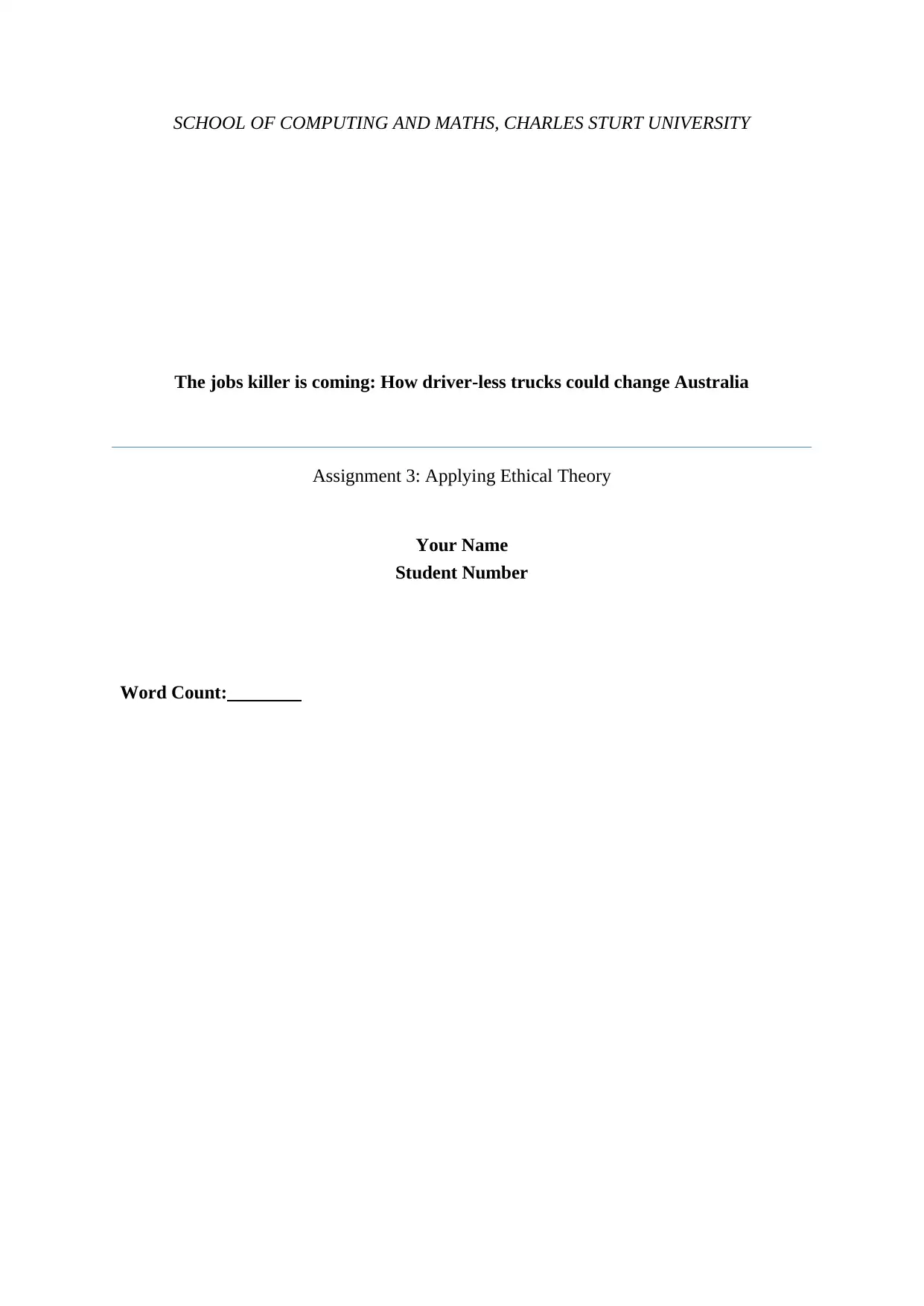
SCHOOL OF COMPUTING AND MATHS, CHARLES STURT UNIVERSITY
The jobs killer is coming: How driver-less trucks could change Australia
Assignment 3: Applying Ethical Theory
Your Name
Student Number
Word Count:
The jobs killer is coming: How driver-less trucks could change Australia
Assignment 3: Applying Ethical Theory
Your Name
Student Number
Word Count:
Paraphrase This Document
Need a fresh take? Get an instant paraphrase of this document with our AI Paraphraser
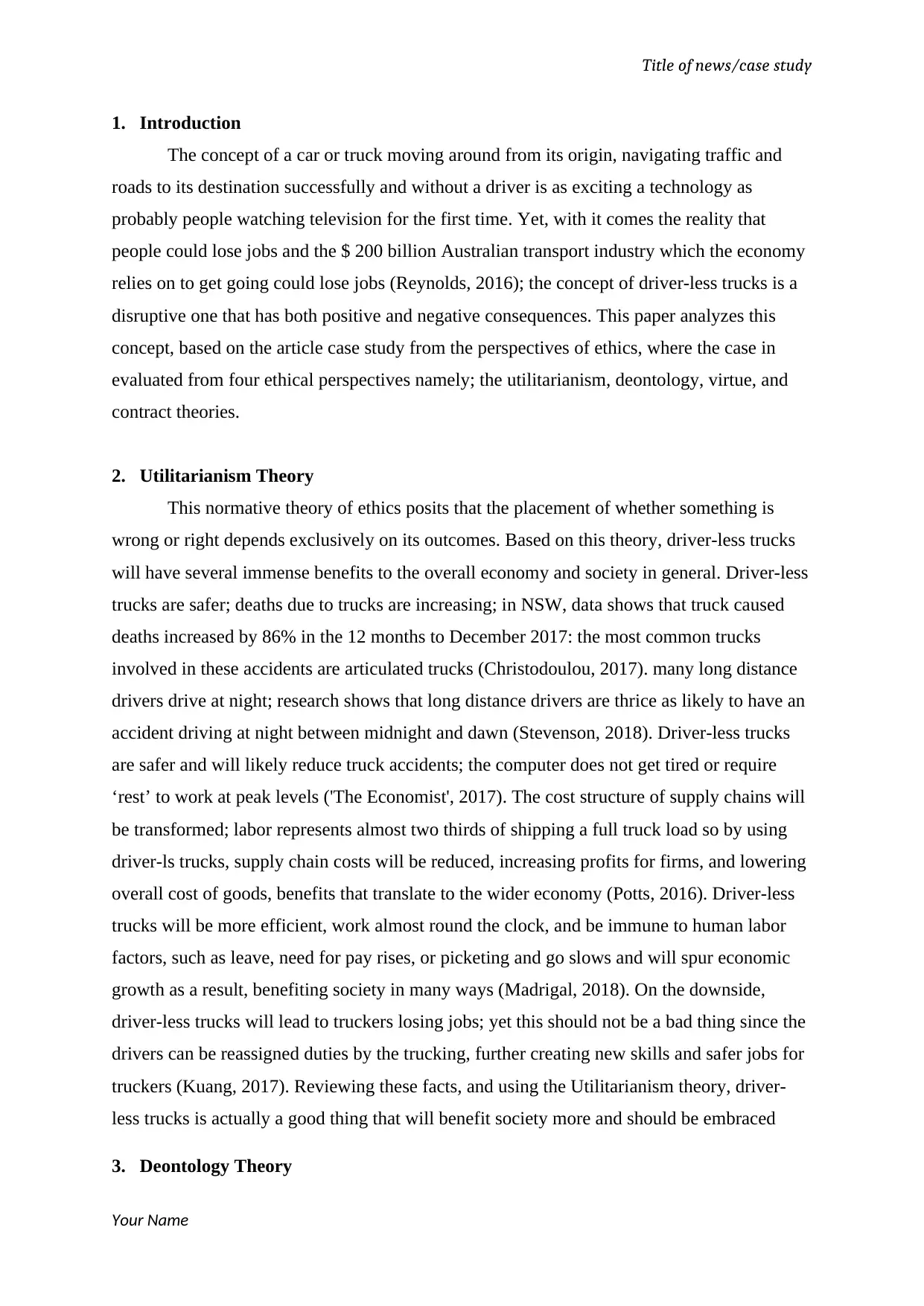
Title of news/case study
1. Introduction
The concept of a car or truck moving around from its origin, navigating traffic and
roads to its destination successfully and without a driver is as exciting a technology as
probably people watching television for the first time. Yet, with it comes the reality that
people could lose jobs and the $ 200 billion Australian transport industry which the economy
relies on to get going could lose jobs (Reynolds, 2016); the concept of driver-less trucks is a
disruptive one that has both positive and negative consequences. This paper analyzes this
concept, based on the article case study from the perspectives of ethics, where the case in
evaluated from four ethical perspectives namely; the utilitarianism, deontology, virtue, and
contract theories.
2. Utilitarianism Theory
This normative theory of ethics posits that the placement of whether something is
wrong or right depends exclusively on its outcomes. Based on this theory, driver-less trucks
will have several immense benefits to the overall economy and society in general. Driver-less
trucks are safer; deaths due to trucks are increasing; in NSW, data shows that truck caused
deaths increased by 86% in the 12 months to December 2017: the most common trucks
involved in these accidents are articulated trucks (Christodoulou, 2017). many long distance
drivers drive at night; research shows that long distance drivers are thrice as likely to have an
accident driving at night between midnight and dawn (Stevenson, 2018). Driver-less trucks
are safer and will likely reduce truck accidents; the computer does not get tired or require
‘rest’ to work at peak levels ('The Economist', 2017). The cost structure of supply chains will
be transformed; labor represents almost two thirds of shipping a full truck load so by using
driver-ls trucks, supply chain costs will be reduced, increasing profits for firms, and lowering
overall cost of goods, benefits that translate to the wider economy (Potts, 2016). Driver-less
trucks will be more efficient, work almost round the clock, and be immune to human labor
factors, such as leave, need for pay rises, or picketing and go slows and will spur economic
growth as a result, benefiting society in many ways (Madrigal, 2018). On the downside,
driver-less trucks will lead to truckers losing jobs; yet this should not be a bad thing since the
drivers can be reassigned duties by the trucking, further creating new skills and safer jobs for
truckers (Kuang, 2017). Reviewing these facts, and using the Utilitarianism theory, driver-
less trucks is actually a good thing that will benefit society more and should be embraced
3. Deontology Theory
Your Name
1. Introduction
The concept of a car or truck moving around from its origin, navigating traffic and
roads to its destination successfully and without a driver is as exciting a technology as
probably people watching television for the first time. Yet, with it comes the reality that
people could lose jobs and the $ 200 billion Australian transport industry which the economy
relies on to get going could lose jobs (Reynolds, 2016); the concept of driver-less trucks is a
disruptive one that has both positive and negative consequences. This paper analyzes this
concept, based on the article case study from the perspectives of ethics, where the case in
evaluated from four ethical perspectives namely; the utilitarianism, deontology, virtue, and
contract theories.
2. Utilitarianism Theory
This normative theory of ethics posits that the placement of whether something is
wrong or right depends exclusively on its outcomes. Based on this theory, driver-less trucks
will have several immense benefits to the overall economy and society in general. Driver-less
trucks are safer; deaths due to trucks are increasing; in NSW, data shows that truck caused
deaths increased by 86% in the 12 months to December 2017: the most common trucks
involved in these accidents are articulated trucks (Christodoulou, 2017). many long distance
drivers drive at night; research shows that long distance drivers are thrice as likely to have an
accident driving at night between midnight and dawn (Stevenson, 2018). Driver-less trucks
are safer and will likely reduce truck accidents; the computer does not get tired or require
‘rest’ to work at peak levels ('The Economist', 2017). The cost structure of supply chains will
be transformed; labor represents almost two thirds of shipping a full truck load so by using
driver-ls trucks, supply chain costs will be reduced, increasing profits for firms, and lowering
overall cost of goods, benefits that translate to the wider economy (Potts, 2016). Driver-less
trucks will be more efficient, work almost round the clock, and be immune to human labor
factors, such as leave, need for pay rises, or picketing and go slows and will spur economic
growth as a result, benefiting society in many ways (Madrigal, 2018). On the downside,
driver-less trucks will lead to truckers losing jobs; yet this should not be a bad thing since the
drivers can be reassigned duties by the trucking, further creating new skills and safer jobs for
truckers (Kuang, 2017). Reviewing these facts, and using the Utilitarianism theory, driver-
less trucks is actually a good thing that will benefit society more and should be embraced
3. Deontology Theory
Your Name
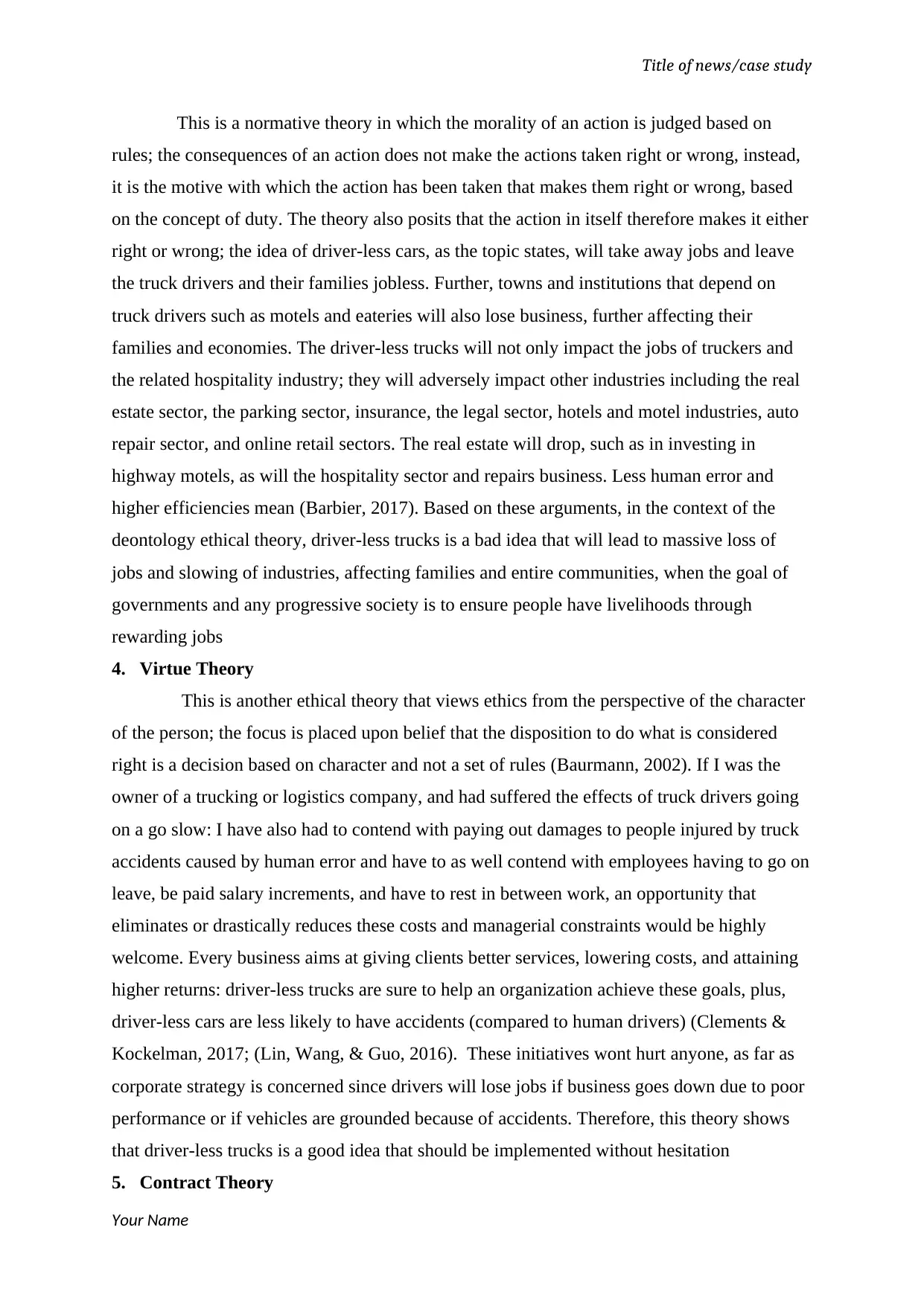
Title of news/case study
This is a normative theory in which the morality of an action is judged based on
rules; the consequences of an action does not make the actions taken right or wrong, instead,
it is the motive with which the action has been taken that makes them right or wrong, based
on the concept of duty. The theory also posits that the action in itself therefore makes it either
right or wrong; the idea of driver-less cars, as the topic states, will take away jobs and leave
the truck drivers and their families jobless. Further, towns and institutions that depend on
truck drivers such as motels and eateries will also lose business, further affecting their
families and economies. The driver-less trucks will not only impact the jobs of truckers and
the related hospitality industry; they will adversely impact other industries including the real
estate sector, the parking sector, insurance, the legal sector, hotels and motel industries, auto
repair sector, and online retail sectors. The real estate will drop, such as in investing in
highway motels, as will the hospitality sector and repairs business. Less human error and
higher efficiencies mean (Barbier, 2017). Based on these arguments, in the context of the
deontology ethical theory, driver-less trucks is a bad idea that will lead to massive loss of
jobs and slowing of industries, affecting families and entire communities, when the goal of
governments and any progressive society is to ensure people have livelihoods through
rewarding jobs
4. Virtue Theory
This is another ethical theory that views ethics from the perspective of the character
of the person; the focus is placed upon belief that the disposition to do what is considered
right is a decision based on character and not a set of rules (Baurmann, 2002). If I was the
owner of a trucking or logistics company, and had suffered the effects of truck drivers going
on a go slow: I have also had to contend with paying out damages to people injured by truck
accidents caused by human error and have to as well contend with employees having to go on
leave, be paid salary increments, and have to rest in between work, an opportunity that
eliminates or drastically reduces these costs and managerial constraints would be highly
welcome. Every business aims at giving clients better services, lowering costs, and attaining
higher returns: driver-less trucks are sure to help an organization achieve these goals, plus,
driver-less cars are less likely to have accidents (compared to human drivers) (Clements &
Kockelman, 2017; (Lin, Wang, & Guo, 2016). These initiatives wont hurt anyone, as far as
corporate strategy is concerned since drivers will lose jobs if business goes down due to poor
performance or if vehicles are grounded because of accidents. Therefore, this theory shows
that driver-less trucks is a good idea that should be implemented without hesitation
5. Contract Theory
Your Name
This is a normative theory in which the morality of an action is judged based on
rules; the consequences of an action does not make the actions taken right or wrong, instead,
it is the motive with which the action has been taken that makes them right or wrong, based
on the concept of duty. The theory also posits that the action in itself therefore makes it either
right or wrong; the idea of driver-less cars, as the topic states, will take away jobs and leave
the truck drivers and their families jobless. Further, towns and institutions that depend on
truck drivers such as motels and eateries will also lose business, further affecting their
families and economies. The driver-less trucks will not only impact the jobs of truckers and
the related hospitality industry; they will adversely impact other industries including the real
estate sector, the parking sector, insurance, the legal sector, hotels and motel industries, auto
repair sector, and online retail sectors. The real estate will drop, such as in investing in
highway motels, as will the hospitality sector and repairs business. Less human error and
higher efficiencies mean (Barbier, 2017). Based on these arguments, in the context of the
deontology ethical theory, driver-less trucks is a bad idea that will lead to massive loss of
jobs and slowing of industries, affecting families and entire communities, when the goal of
governments and any progressive society is to ensure people have livelihoods through
rewarding jobs
4. Virtue Theory
This is another ethical theory that views ethics from the perspective of the character
of the person; the focus is placed upon belief that the disposition to do what is considered
right is a decision based on character and not a set of rules (Baurmann, 2002). If I was the
owner of a trucking or logistics company, and had suffered the effects of truck drivers going
on a go slow: I have also had to contend with paying out damages to people injured by truck
accidents caused by human error and have to as well contend with employees having to go on
leave, be paid salary increments, and have to rest in between work, an opportunity that
eliminates or drastically reduces these costs and managerial constraints would be highly
welcome. Every business aims at giving clients better services, lowering costs, and attaining
higher returns: driver-less trucks are sure to help an organization achieve these goals, plus,
driver-less cars are less likely to have accidents (compared to human drivers) (Clements &
Kockelman, 2017; (Lin, Wang, & Guo, 2016). These initiatives wont hurt anyone, as far as
corporate strategy is concerned since drivers will lose jobs if business goes down due to poor
performance or if vehicles are grounded because of accidents. Therefore, this theory shows
that driver-less trucks is a good idea that should be implemented without hesitation
5. Contract Theory
Your Name
⊘ This is a preview!⊘
Do you want full access?
Subscribe today to unlock all pages.

Trusted by 1+ million students worldwide
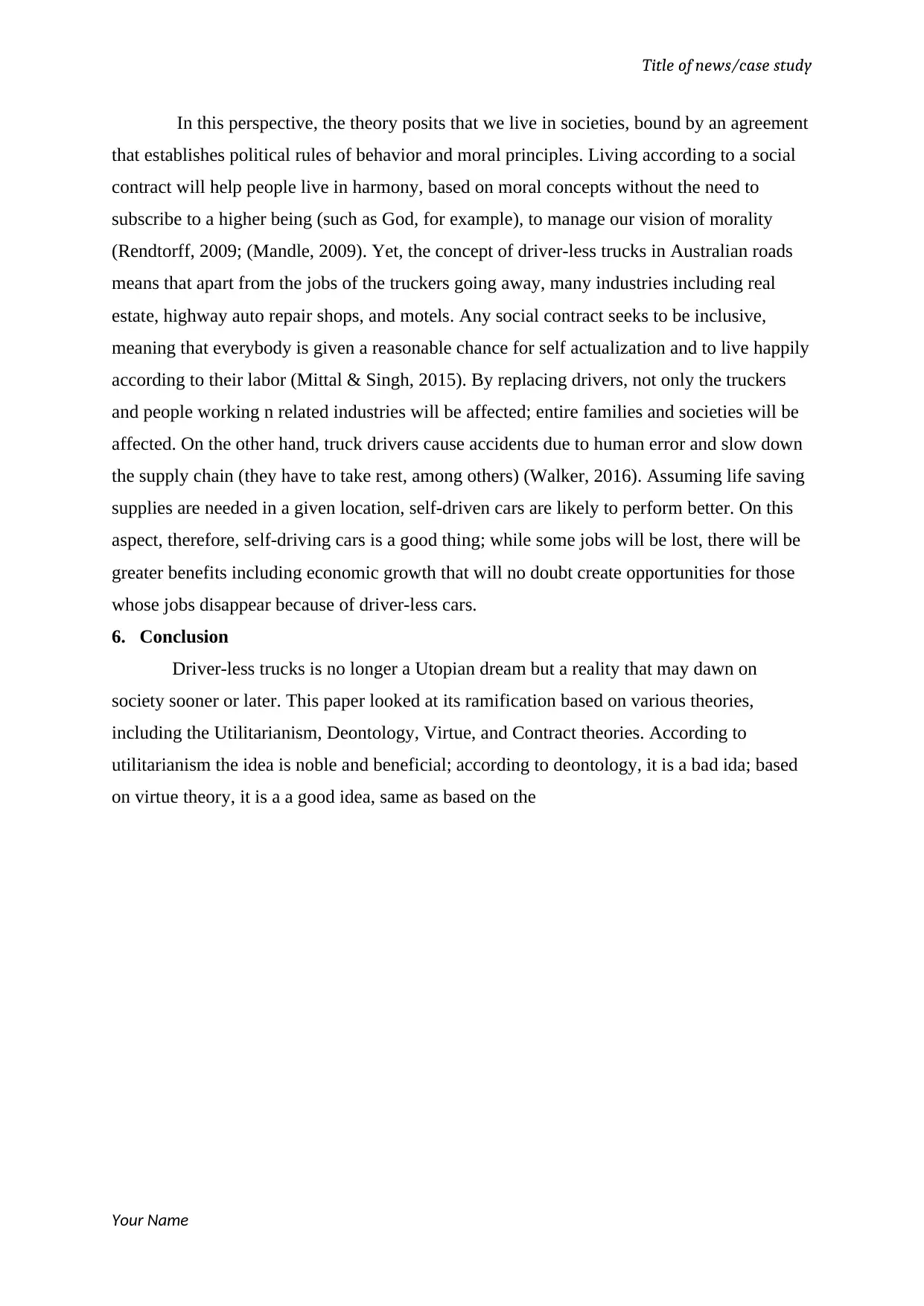
Title of news/case study
In this perspective, the theory posits that we live in societies, bound by an agreement
that establishes political rules of behavior and moral principles. Living according to a social
contract will help people live in harmony, based on moral concepts without the need to
subscribe to a higher being (such as God, for example), to manage our vision of morality
(Rendtorff, 2009; (Mandle, 2009). Yet, the concept of driver-less trucks in Australian roads
means that apart from the jobs of the truckers going away, many industries including real
estate, highway auto repair shops, and motels. Any social contract seeks to be inclusive,
meaning that everybody is given a reasonable chance for self actualization and to live happily
according to their labor (Mittal & Singh, 2015). By replacing drivers, not only the truckers
and people working n related industries will be affected; entire families and societies will be
affected. On the other hand, truck drivers cause accidents due to human error and slow down
the supply chain (they have to take rest, among others) (Walker, 2016). Assuming life saving
supplies are needed in a given location, self-driven cars are likely to perform better. On this
aspect, therefore, self-driving cars is a good thing; while some jobs will be lost, there will be
greater benefits including economic growth that will no doubt create opportunities for those
whose jobs disappear because of driver-less cars.
6. Conclusion
Driver-less trucks is no longer a Utopian dream but a reality that may dawn on
society sooner or later. This paper looked at its ramification based on various theories,
including the Utilitarianism, Deontology, Virtue, and Contract theories. According to
utilitarianism the idea is noble and beneficial; according to deontology, it is a bad ida; based
on virtue theory, it is a a good idea, same as based on the
Your Name
In this perspective, the theory posits that we live in societies, bound by an agreement
that establishes political rules of behavior and moral principles. Living according to a social
contract will help people live in harmony, based on moral concepts without the need to
subscribe to a higher being (such as God, for example), to manage our vision of morality
(Rendtorff, 2009; (Mandle, 2009). Yet, the concept of driver-less trucks in Australian roads
means that apart from the jobs of the truckers going away, many industries including real
estate, highway auto repair shops, and motels. Any social contract seeks to be inclusive,
meaning that everybody is given a reasonable chance for self actualization and to live happily
according to their labor (Mittal & Singh, 2015). By replacing drivers, not only the truckers
and people working n related industries will be affected; entire families and societies will be
affected. On the other hand, truck drivers cause accidents due to human error and slow down
the supply chain (they have to take rest, among others) (Walker, 2016). Assuming life saving
supplies are needed in a given location, self-driven cars are likely to perform better. On this
aspect, therefore, self-driving cars is a good thing; while some jobs will be lost, there will be
greater benefits including economic growth that will no doubt create opportunities for those
whose jobs disappear because of driver-less cars.
6. Conclusion
Driver-less trucks is no longer a Utopian dream but a reality that may dawn on
society sooner or later. This paper looked at its ramification based on various theories,
including the Utilitarianism, Deontology, Virtue, and Contract theories. According to
utilitarianism the idea is noble and beneficial; according to deontology, it is a bad ida; based
on virtue theory, it is a a good idea, same as based on the
Your Name
Paraphrase This Document
Need a fresh take? Get an instant paraphrase of this document with our AI Paraphraser
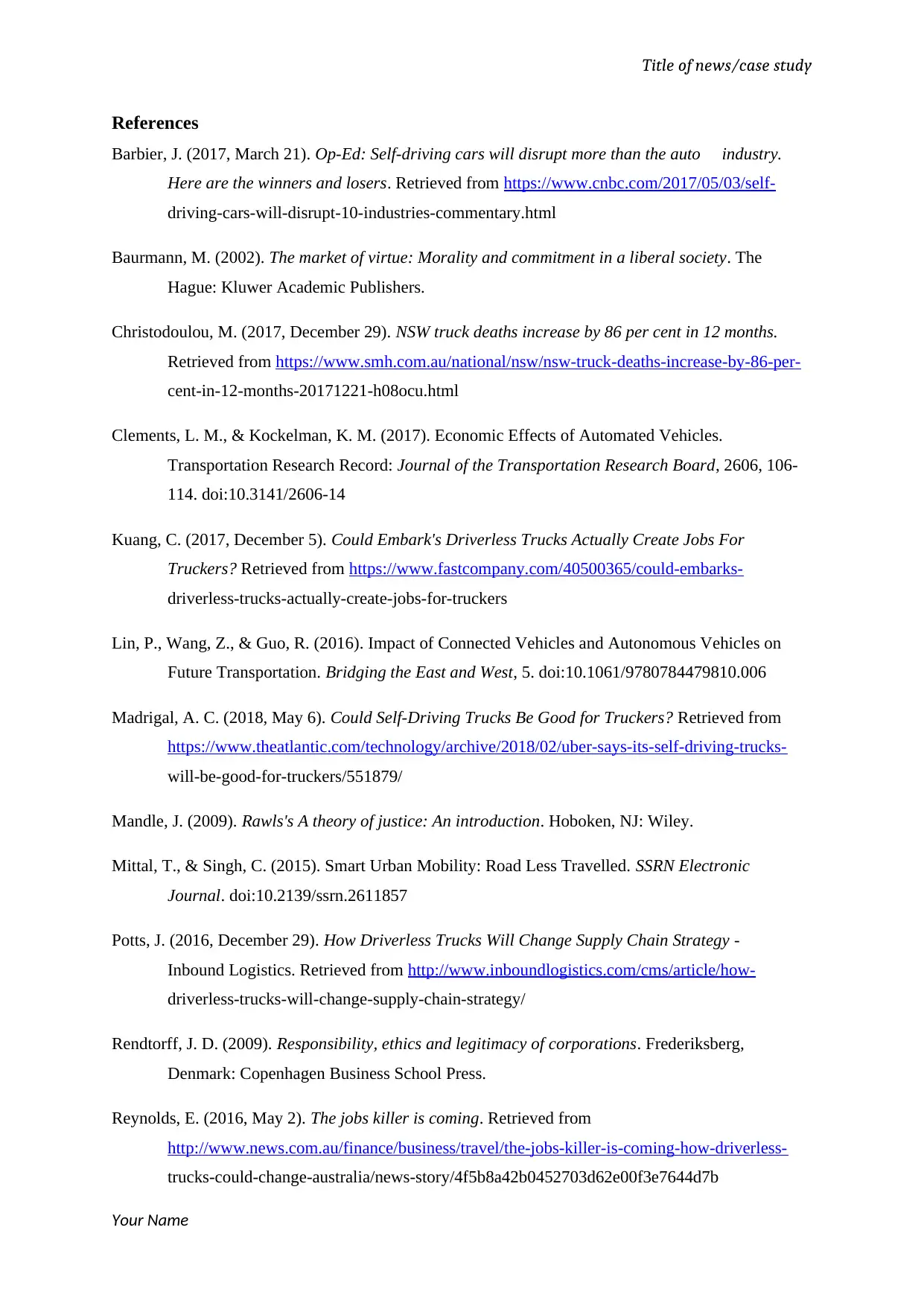
Title of news/case study
References
Barbier, J. (2017, March 21). Op-Ed: Self-driving cars will disrupt more than the auto industry.
Here are the winners and losers. Retrieved from https://www.cnbc.com/2017/05/03/self-
driving-cars-will-disrupt-10-industries-commentary.html
Baurmann, M. (2002). The market of virtue: Morality and commitment in a liberal society. The
Hague: Kluwer Academic Publishers.
Christodoulou, M. (2017, December 29). NSW truck deaths increase by 86 per cent in 12 months.
Retrieved from https://www.smh.com.au/national/nsw/nsw-truck-deaths-increase-by-86-per-
cent-in-12-months-20171221-h08ocu.html
Clements, L. M., & Kockelman, K. M. (2017). Economic Effects of Automated Vehicles.
Transportation Research Record: Journal of the Transportation Research Board, 2606, 106-
114. doi:10.3141/2606-14
Kuang, C. (2017, December 5). Could Embark's Driverless Trucks Actually Create Jobs For
Truckers? Retrieved from https://www.fastcompany.com/40500365/could-embarks-
driverless-trucks-actually-create-jobs-for-truckers
Lin, P., Wang, Z., & Guo, R. (2016). Impact of Connected Vehicles and Autonomous Vehicles on
Future Transportation. Bridging the East and West, 5. doi:10.1061/9780784479810.006
Madrigal, A. C. (2018, May 6). Could Self-Driving Trucks Be Good for Truckers? Retrieved from
https://www.theatlantic.com/technology/archive/2018/02/uber-says-its-self-driving-trucks-
will-be-good-for-truckers/551879/
Mandle, J. (2009). Rawls's A theory of justice: An introduction. Hoboken, NJ: Wiley.
Mittal, T., & Singh, C. (2015). Smart Urban Mobility: Road Less Travelled. SSRN Electronic
Journal. doi:10.2139/ssrn.2611857
Potts, J. (2016, December 29). How Driverless Trucks Will Change Supply Chain Strategy -
Inbound Logistics. Retrieved from http://www.inboundlogistics.com/cms/article/how-
driverless-trucks-will-change-supply-chain-strategy/
Rendtorff, J. D. (2009). Responsibility, ethics and legitimacy of corporations. Frederiksberg,
Denmark: Copenhagen Business School Press.
Reynolds, E. (2016, May 2). The jobs killer is coming. Retrieved from
http://www.news.com.au/finance/business/travel/the-jobs-killer-is-coming-how-driverless-
trucks-could-change-australia/news-story/4f5b8a42b0452703d62e00f3e7644d7b
Your Name
References
Barbier, J. (2017, March 21). Op-Ed: Self-driving cars will disrupt more than the auto industry.
Here are the winners and losers. Retrieved from https://www.cnbc.com/2017/05/03/self-
driving-cars-will-disrupt-10-industries-commentary.html
Baurmann, M. (2002). The market of virtue: Morality and commitment in a liberal society. The
Hague: Kluwer Academic Publishers.
Christodoulou, M. (2017, December 29). NSW truck deaths increase by 86 per cent in 12 months.
Retrieved from https://www.smh.com.au/national/nsw/nsw-truck-deaths-increase-by-86-per-
cent-in-12-months-20171221-h08ocu.html
Clements, L. M., & Kockelman, K. M. (2017). Economic Effects of Automated Vehicles.
Transportation Research Record: Journal of the Transportation Research Board, 2606, 106-
114. doi:10.3141/2606-14
Kuang, C. (2017, December 5). Could Embark's Driverless Trucks Actually Create Jobs For
Truckers? Retrieved from https://www.fastcompany.com/40500365/could-embarks-
driverless-trucks-actually-create-jobs-for-truckers
Lin, P., Wang, Z., & Guo, R. (2016). Impact of Connected Vehicles and Autonomous Vehicles on
Future Transportation. Bridging the East and West, 5. doi:10.1061/9780784479810.006
Madrigal, A. C. (2018, May 6). Could Self-Driving Trucks Be Good for Truckers? Retrieved from
https://www.theatlantic.com/technology/archive/2018/02/uber-says-its-self-driving-trucks-
will-be-good-for-truckers/551879/
Mandle, J. (2009). Rawls's A theory of justice: An introduction. Hoboken, NJ: Wiley.
Mittal, T., & Singh, C. (2015). Smart Urban Mobility: Road Less Travelled. SSRN Electronic
Journal. doi:10.2139/ssrn.2611857
Potts, J. (2016, December 29). How Driverless Trucks Will Change Supply Chain Strategy -
Inbound Logistics. Retrieved from http://www.inboundlogistics.com/cms/article/how-
driverless-trucks-will-change-supply-chain-strategy/
Rendtorff, J. D. (2009). Responsibility, ethics and legitimacy of corporations. Frederiksberg,
Denmark: Copenhagen Business School Press.
Reynolds, E. (2016, May 2). The jobs killer is coming. Retrieved from
http://www.news.com.au/finance/business/travel/the-jobs-killer-is-coming-how-driverless-
trucks-could-change-australia/news-story/4f5b8a42b0452703d62e00f3e7644d7b
Your Name
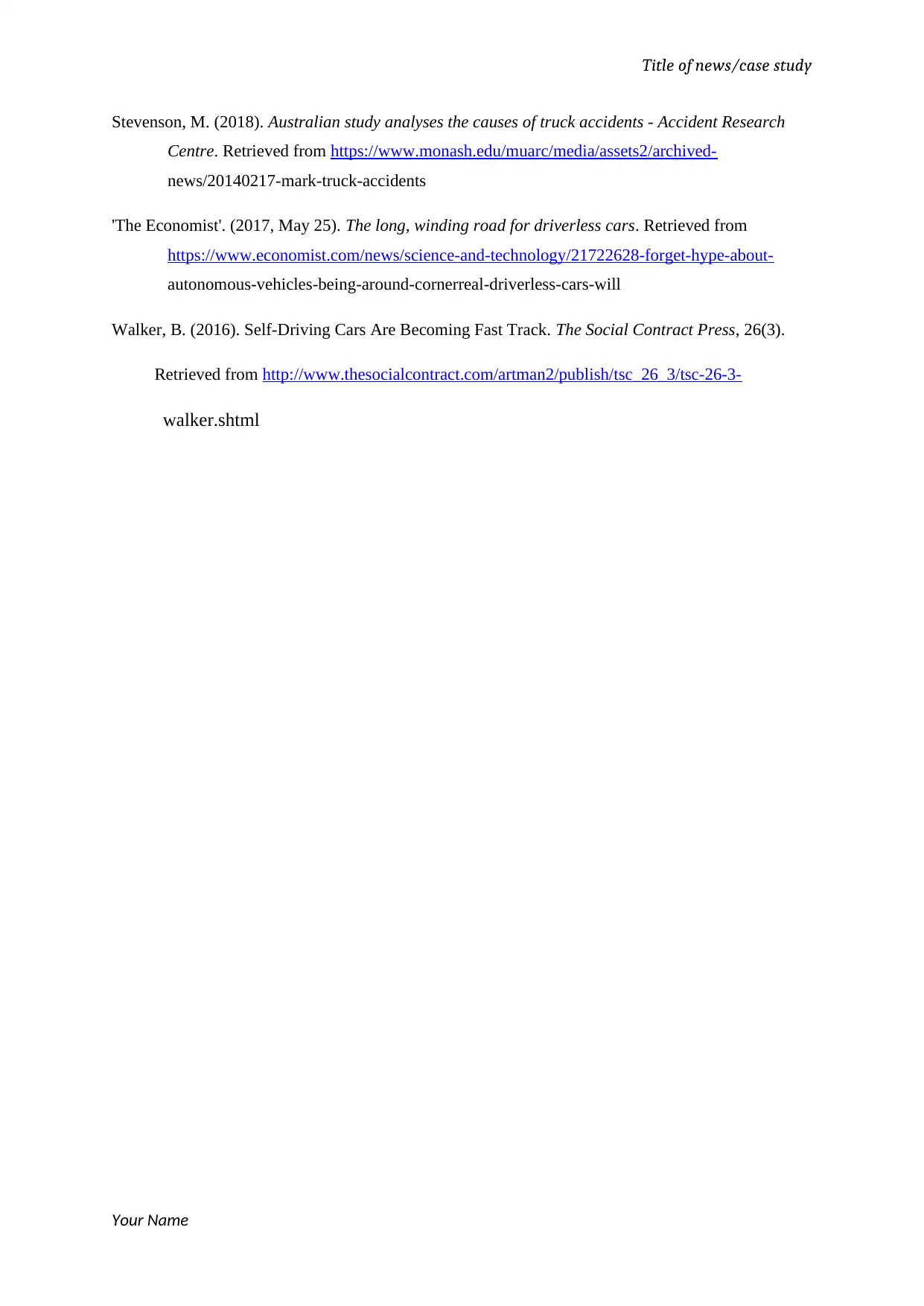
Title of news/case study
Stevenson, M. (2018). Australian study analyses the causes of truck accidents - Accident Research
Centre. Retrieved from https://www.monash.edu/muarc/media/assets2/archived-
news/20140217-mark-truck-accidents
'The Economist'. (2017, May 25). The long, winding road for driverless cars. Retrieved from
https://www.economist.com/news/science-and-technology/21722628-forget-hype-about-
autonomous-vehicles-being-around-cornerreal-driverless-cars-will
Walker, B. (2016). Self-Driving Cars Are Becoming Fast Track. The Social Contract Press, 26(3).
Retrieved from http://www.thesocialcontract.com/artman2/publish/tsc_26_3/tsc-26-3-
walker.shtml
Your Name
Stevenson, M. (2018). Australian study analyses the causes of truck accidents - Accident Research
Centre. Retrieved from https://www.monash.edu/muarc/media/assets2/archived-
news/20140217-mark-truck-accidents
'The Economist'. (2017, May 25). The long, winding road for driverless cars. Retrieved from
https://www.economist.com/news/science-and-technology/21722628-forget-hype-about-
autonomous-vehicles-being-around-cornerreal-driverless-cars-will
Walker, B. (2016). Self-Driving Cars Are Becoming Fast Track. The Social Contract Press, 26(3).
Retrieved from http://www.thesocialcontract.com/artman2/publish/tsc_26_3/tsc-26-3-
walker.shtml
Your Name
⊘ This is a preview!⊘
Do you want full access?
Subscribe today to unlock all pages.

Trusted by 1+ million students worldwide
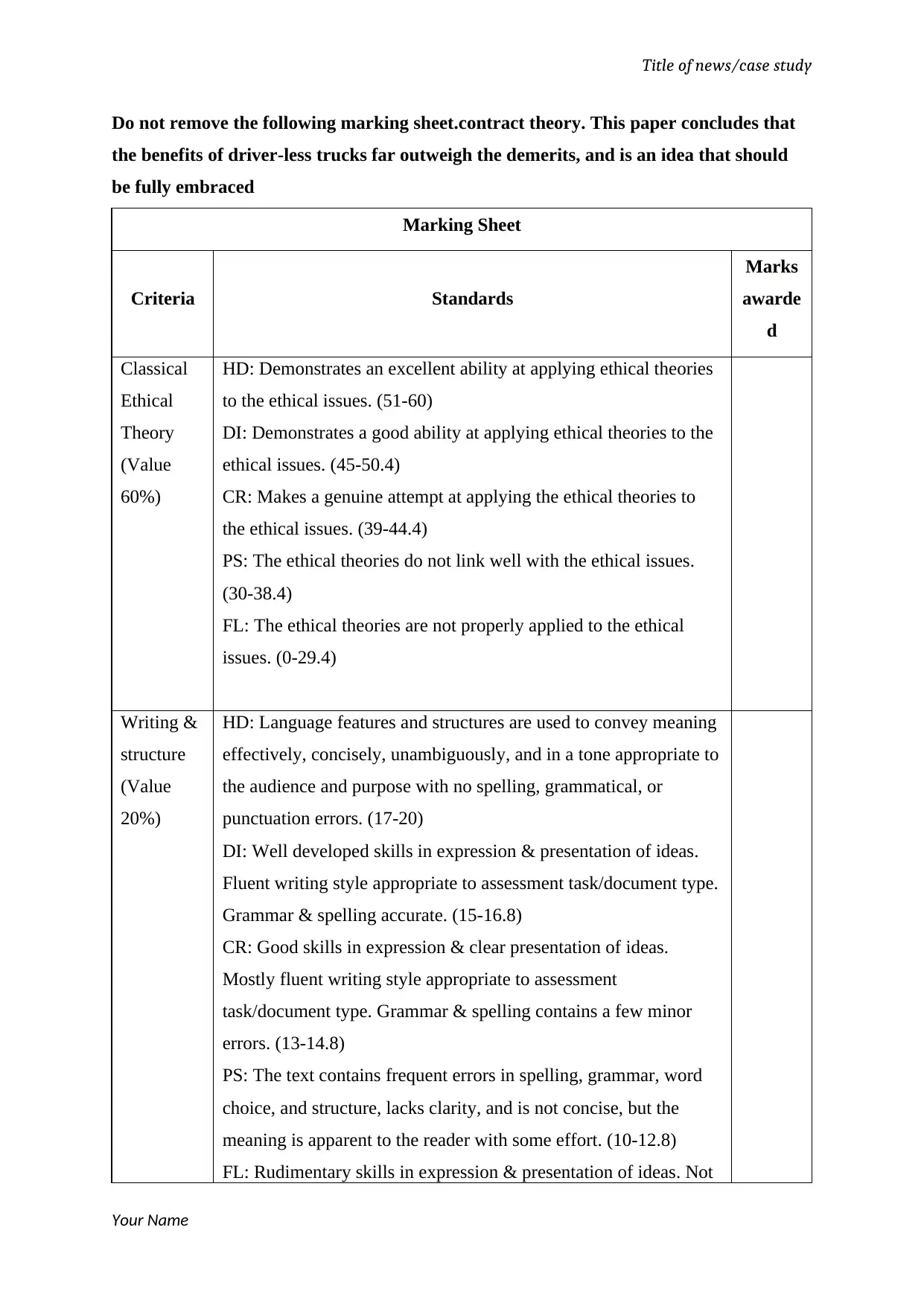
Title of news/case study
Do not remove the following marking sheet.contract theory. This paper concludes that
the benefits of driver-less trucks far outweigh the demerits, and is an idea that should
be fully embraced
Marking Sheet
Criteria Standards
Marks
awarde
d
Classical
Ethical
Theory
(Value
60%)
HD: Demonstrates an excellent ability at applying ethical theories
to the ethical issues. (51-60)
DI: Demonstrates a good ability at applying ethical theories to the
ethical issues. (45-50.4)
CR: Makes a genuine attempt at applying the ethical theories to
the ethical issues. (39-44.4)
PS: The ethical theories do not link well with the ethical issues.
(30-38.4)
FL: The ethical theories are not properly applied to the ethical
issues. (0-29.4)
Writing &
structure
(Value
20%)
HD: Language features and structures are used to convey meaning
effectively, concisely, unambiguously, and in a tone appropriate to
the audience and purpose with no spelling, grammatical, or
punctuation errors. (17-20)
DI: Well developed skills in expression & presentation of ideas.
Fluent writing style appropriate to assessment task/document type.
Grammar & spelling accurate. (15-16.8)
CR: Good skills in expression & clear presentation of ideas.
Mostly fluent writing style appropriate to assessment
task/document type. Grammar & spelling contains a few minor
errors. (13-14.8)
PS: The text contains frequent errors in spelling, grammar, word
choice, and structure, lacks clarity, and is not concise, but the
meaning is apparent to the reader with some effort. (10-12.8)
FL: Rudimentary skills in expression & presentation of ideas. Not
Your Name
Do not remove the following marking sheet.contract theory. This paper concludes that
the benefits of driver-less trucks far outweigh the demerits, and is an idea that should
be fully embraced
Marking Sheet
Criteria Standards
Marks
awarde
d
Classical
Ethical
Theory
(Value
60%)
HD: Demonstrates an excellent ability at applying ethical theories
to the ethical issues. (51-60)
DI: Demonstrates a good ability at applying ethical theories to the
ethical issues. (45-50.4)
CR: Makes a genuine attempt at applying the ethical theories to
the ethical issues. (39-44.4)
PS: The ethical theories do not link well with the ethical issues.
(30-38.4)
FL: The ethical theories are not properly applied to the ethical
issues. (0-29.4)
Writing &
structure
(Value
20%)
HD: Language features and structures are used to convey meaning
effectively, concisely, unambiguously, and in a tone appropriate to
the audience and purpose with no spelling, grammatical, or
punctuation errors. (17-20)
DI: Well developed skills in expression & presentation of ideas.
Fluent writing style appropriate to assessment task/document type.
Grammar & spelling accurate. (15-16.8)
CR: Good skills in expression & clear presentation of ideas.
Mostly fluent writing style appropriate to assessment
task/document type. Grammar & spelling contains a few minor
errors. (13-14.8)
PS: The text contains frequent errors in spelling, grammar, word
choice, and structure, lacks clarity, and is not concise, but the
meaning is apparent to the reader with some effort. (10-12.8)
FL: Rudimentary skills in expression & presentation of ideas. Not
Your Name
Paraphrase This Document
Need a fresh take? Get an instant paraphrase of this document with our AI Paraphraser
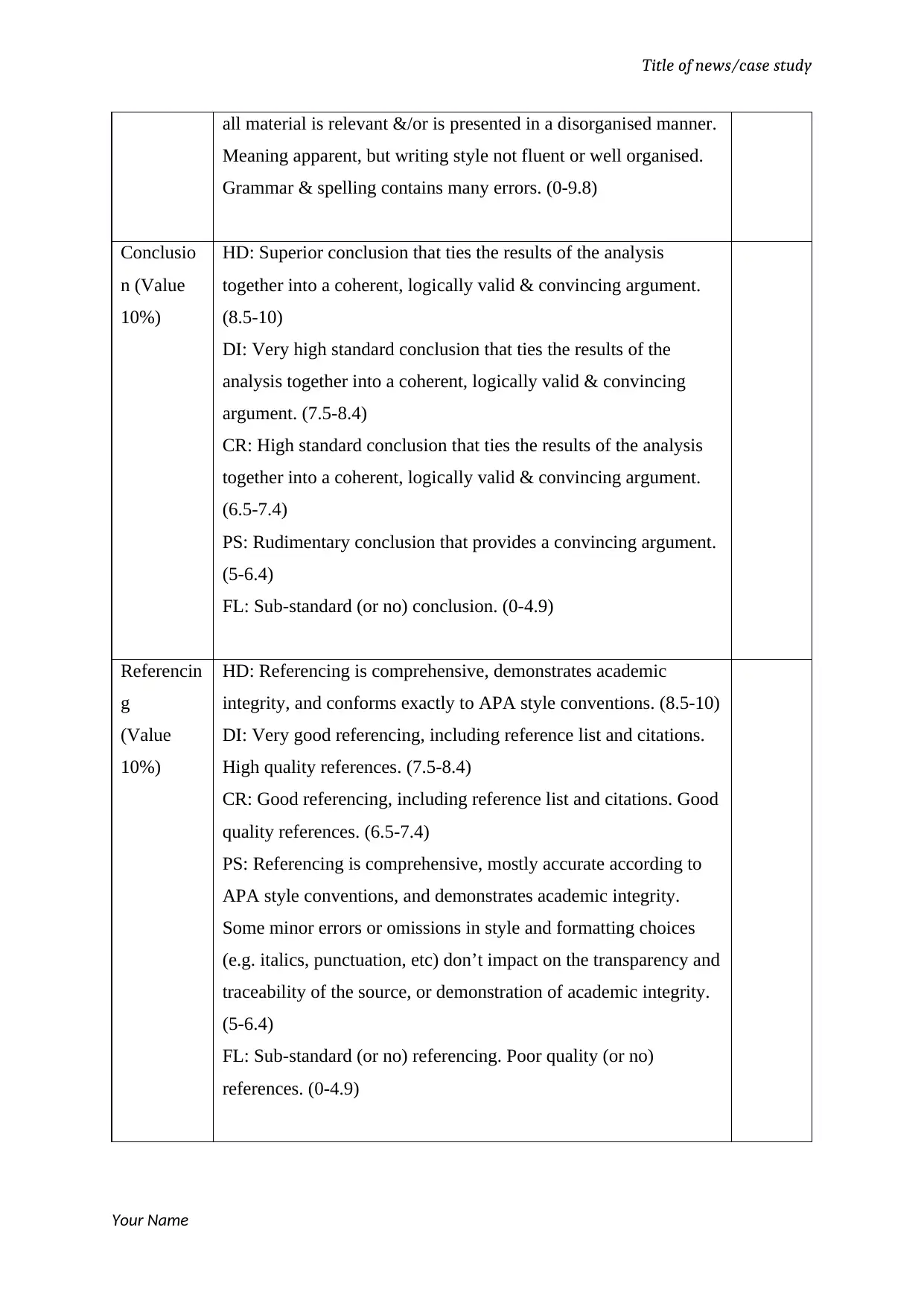
Title of news/case study
all material is relevant &/or is presented in a disorganised manner.
Meaning apparent, but writing style not fluent or well organised.
Grammar & spelling contains many errors. (0-9.8)
Conclusio
n (Value
10%)
HD: Superior conclusion that ties the results of the analysis
together into a coherent, logically valid & convincing argument.
(8.5-10)
DI: Very high standard conclusion that ties the results of the
analysis together into a coherent, logically valid & convincing
argument. (7.5-8.4)
CR: High standard conclusion that ties the results of the analysis
together into a coherent, logically valid & convincing argument.
(6.5-7.4)
PS: Rudimentary conclusion that provides a convincing argument.
(5-6.4)
FL: Sub-standard (or no) conclusion. (0-4.9)
Referencin
g
(Value
10%)
HD: Referencing is comprehensive, demonstrates academic
integrity, and conforms exactly to APA style conventions. (8.5-10)
DI: Very good referencing, including reference list and citations.
High quality references. (7.5-8.4)
CR: Good referencing, including reference list and citations. Good
quality references. (6.5-7.4)
PS: Referencing is comprehensive, mostly accurate according to
APA style conventions, and demonstrates academic integrity.
Some minor errors or omissions in style and formatting choices
(e.g. italics, punctuation, etc) don’t impact on the transparency and
traceability of the source, or demonstration of academic integrity.
(5-6.4)
FL: Sub-standard (or no) referencing. Poor quality (or no)
references. (0-4.9)
Your Name
all material is relevant &/or is presented in a disorganised manner.
Meaning apparent, but writing style not fluent or well organised.
Grammar & spelling contains many errors. (0-9.8)
Conclusio
n (Value
10%)
HD: Superior conclusion that ties the results of the analysis
together into a coherent, logically valid & convincing argument.
(8.5-10)
DI: Very high standard conclusion that ties the results of the
analysis together into a coherent, logically valid & convincing
argument. (7.5-8.4)
CR: High standard conclusion that ties the results of the analysis
together into a coherent, logically valid & convincing argument.
(6.5-7.4)
PS: Rudimentary conclusion that provides a convincing argument.
(5-6.4)
FL: Sub-standard (or no) conclusion. (0-4.9)
Referencin
g
(Value
10%)
HD: Referencing is comprehensive, demonstrates academic
integrity, and conforms exactly to APA style conventions. (8.5-10)
DI: Very good referencing, including reference list and citations.
High quality references. (7.5-8.4)
CR: Good referencing, including reference list and citations. Good
quality references. (6.5-7.4)
PS: Referencing is comprehensive, mostly accurate according to
APA style conventions, and demonstrates academic integrity.
Some minor errors or omissions in style and formatting choices
(e.g. italics, punctuation, etc) don’t impact on the transparency and
traceability of the source, or demonstration of academic integrity.
(5-6.4)
FL: Sub-standard (or no) referencing. Poor quality (or no)
references. (0-4.9)
Your Name

Title of news/case study
Total
Marks
Your Name
Total
Marks
Your Name
⊘ This is a preview!⊘
Do you want full access?
Subscribe today to unlock all pages.

Trusted by 1+ million students worldwide
1 out of 9
Related Documents
Your All-in-One AI-Powered Toolkit for Academic Success.
+13062052269
info@desklib.com
Available 24*7 on WhatsApp / Email
![[object Object]](/_next/static/media/star-bottom.7253800d.svg)
Unlock your academic potential
Copyright © 2020–2025 A2Z Services. All Rights Reserved. Developed and managed by ZUCOL.




